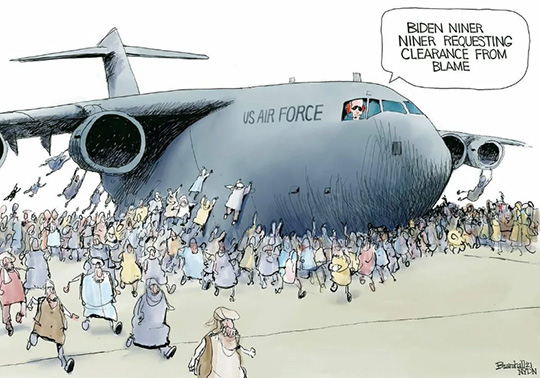
Yes, U.S. officials have briefed Ukraine “on the dangers of overextending its ambitions and spreading its troops too thin”. So, the same warning Biden gave then-Afghan President Ashraf Ghani as the Taliban moved to sweep across the country during the U.S. military withdrawal in 2021, POLITICO notes. Is history repeating itself?
The Biden administration is quietly preparing for the possibility that if Ukraine’s spring counteroffensive falls short of expectations, critics at home and allies abroad will argue that America has come up short, too.
Publicly, President Joe Biden’s team has offered unwavering support for Ukraine, pledging to load it up with weapons and economic aid for “as long as it takes.” But, if the impending fighting season yields limited gains, administration officials have expressed privately they fear being faced with a two-headed monster attacking it from the hawkish and dovish ends of the spectrum.
One side will say that Ukraine’s advances would’ve worked had the administration given Kyiv everything it asked for, namely longer-range missiles, fighter jets and more air defenses.
The other side, administration officials worry, will claim Ukraine’s shortcoming proves it can’t force Russia out of its territory completely.
That doesn’t even account for the reaction of America’s allies, mainly in Europe, who may see a peace negotiation between Ukraine and Russia as a more attractive option if Kyiv can’t prove victory is around the corner.
But belief in the strategic cause is one thing. Belief in the tactics is another — and behind closed doors the administration is worried about what Ukraine can accomplish.
Those concerns recently spilled out into the open during a leak of classified information onto social media. A top secret assessment from early February stated that Ukraine would fall “well short” of its counteroffensive goals. More current American assessments are that Ukraine may make some progress in the south and east, but won’t be able to repeat last year’s success.
Ukraine has hoped to sever Russia’s land bridge to Crimea and U.S. officials are now skeptical that will happen, according to two administration officials familiar with the assessment.
Moreover, U.S. intelligence indicates that Ukraine simply does not have the ability to push Russian troops from where they were deeply entrenched — and a similar feeling has taken hold about the battlefield elsewhere in Ukraine, according to officials. Ukrainian President Volodymyr Zelenskyy says the U.S. hasn’t adequately armed his forces properly and so, until then, the counteroffensive can’t begin.
There is belief that Kyiv is willing to consider adjusting its goals, according to American officials, and a more modest aim might be easier to be sold as a win.
“If the counteroffensive does not go well, the administration has only itself to blame for withholding certain types of arms and aid at the time when it was most needed,” said Kurt Volker, the special envoy for Ukraine during the Trump administration.
A counteroffensive that doesn’t meet expectations will also cause allies in foreign capitals to question how much more they can spare if Kyiv’s victory looks farther and farther away.
“European public support may wane over time as European energy and economic costs stay high,” said Clementine Starling, a director and fellow at the Atlantic Council think tank in Washington, D.C. “A fracturing of transatlantic support will likely hurt U.S. domestic support and Congress and the Biden administration may struggle to sustain it.”
Many European nations could also push Kyiv to bring the fighting to an end.
Biden and his top aides have publicly stressed that Zelenskyy should only begin peace talks when he is ready. But Washington has also communicated to Kyiv some political realities: at some point, especially with Republicans in control of the House of Representatives, the pace of U.S. aid will likely slow.
Officials in Washington, though not pressing Kyiv, have begun preparing for what those conversations could look like and understand it may be a tough political sell at home for Zelenskyy.
“If Ukraine can’t gain dramatically on the battlefield, the question inevitably arises as to whether it is time for a negotiated stop to the fighting,” said Richard Haass, president of the Council on Foreign Relations. “It’s expensive, we’re running low on munitions, we’ve got other contingencies around the world to prepare for. It’s legitimate to ask all these questions without compromising Ukraine’s goals. It’s simply a question of means.”
…What is the next US step? Running out as in Afgan-2021?
read more in our Telegram-channel https://t.me/The_International_Affairs

 10:19 27.04.2023 •
10:19 27.04.2023 •






















